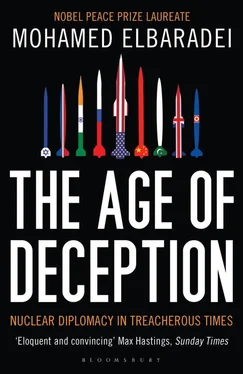Iran moved rapidly to implement the agreement. One week later, IAEA inspectors confirmed that the suspension was in place.
The signing of the Paris Agreement set a positive mood for the November Board meeting. At the outset, even the Americans seemed pleased, expressing appreciation for the comprehensive overview I gave of the Iran inspections to date. It was a striking departure from the U.S. attitude of just two months earlier, when they had made such a ruckus over the Parchin photos.
The Americans even refrained from attempting to block the November Board resolution on Iran, although they were not pleased with it. Jackie Sanders, the U.S. representative and a Bolton protegé, implied that nothing of any significance had changed with Iran, telling the Board that its expectations were “sadly familiar.” She made clear that the United States would be willing, if need be, to refer Iran to the Security Council on its own, without the Board’s consensus. But still they let the resolution pass.
The Iranians, for their part, were hopeful that they had reached a turning point. Sirus Nasseri pretended to fall asleep in the boardroom during Sanders’s speech. Hassan Rowhani described the Board’s endorsement of the Paris Agreement as a “great victory.” Speaking to the BBC, he said that “the whole world had turned down America’s calls” to refer Iran to the Security Council. With some hyperbole—in all likelihood playing to his audience in Tehran—he described the U.S. representative to the IAEA as “enraged and in tears.” The upcoming negotiations were, he said, a “historical opportunity for Iran and Europe to prove to the world that unilateralism is condemned.” [21] BBC News, November 30, 2004.
The agreement, it turned out, was the easy part. In my discussions with the Europeans, they seemed to clearly understand how important it was for them to present the Iranians with a concrete, meaningful package, as an outcome of the negotiations. The Germans were the most optimistic. The British were more conservative, trying to keep the Americans happy. The French were somewhere in between. But all three were hopeful, armed as well with an endorsement from the G-8 [22] The Group of 8 is a forum of major industrialized countries. Formerly known as the G-7, it included Canada, France, Germany, Italy, Japan, the United Kingdom, and the United States. It became known as the G-8 with the addition of Russia in 1997.
for offering strong concessions to the Iranians.
For several months, expectations that the negotiations would lead to an overall diplomatic solution were high. Iran’s cooperation with the IAEA stayed strong; there were only a few remaining inspection issues. At the March 2005 Board meeting, Iran’s nuclear program was not on the agenda for the first time in almost two years—a fact that Iran’s negotiators were quick to point out as progress. The United States was even reported to be considering joining the EU in offering Iran incentives. [23] Robin Wright, “Bush Weighs Offers to Iran; U.S. Might Join Effort to Halt Nuclear Program,” Washington Post , February 28, 2005.
But in Iran, concern was mounting. The negotiations were not making visible headway. Rowhani was under pressure from his government to show progress—in the form of concrete “deliverables”—for his cooperative approach. He was pressing his European counterparts to at least agree to let the Iranians resume some aspect of their nuclear operations soon, even at the R&D level. From what I could understand, the Iranian plan had always been to complete a conversion plant and a small pilot enrichment facility, and then to agree, as part of their negotiations with the Europeans, to freeze the industrial-scale enrichment facility at Natanz for a number of years.
In March 2005, Rowhani submitted a paper to the EU-3 with the essence of this proposal. It envisaged that Iran would start enrichment with five hundred centrifuges at its pilot plant, which could build over time to three thousand centrifuges—well short of the planned fifty-four-thousand-centrifuge capacity at the full-scale Natanz facility. This was an initial offer, clearly open to discussion; the key for Rowhani was to be able to send the message to the Iranian public that Iran’s enrichment program was still ongoing. The IAEA would be able to closely monitor activity at the pilot facility. Iran would freeze its industrial scale efforts. In return, Iran hoped to receive Western nuclear power and other technologies, trade agreements, and additional incentives.
The Iranian presidential election was coming up in June, and political rhetoric was heated. In May, citing the lack of an offer from the Europeans as a violation of the Paris Agreement, the Iranians threatened to end their suspension. The Europeans asked for more time to develop a detailed proposal. Iran agreed to wait until August.
In late June, Iran elected Mahmoud Ahmadinejad, the mayor of Tehran, a deeply religious man and among the fiercest hard-liners of all the presidential candidates. Shortly after the election, and well before receiving the European proposal, Iranian officials began sending messages that they would not continue with the full suspension. The mood in diplomatic circles rapidly turned bleak.
Less than two months later, the bottom fell out of the negotiations. The offer prepared by the Europeans proposed few of the benefits discussed at the time of the Paris Agreement. It did not include nuclear power reactors, only research reactors. The French could have provided nuclear power technology to Iran, except that Areva, the French company, was unwilling to jeopardize its relationship with the United States, its biggest market. The United States had refused to give the green light to Areva, so the Europeans’ offer simply made a vague statement about giving Iran access to the foreign nuclear technology markets.
I was told that the Europeans were trying to imitate a bazaar style of negotiation and had refrained from including their full offer up front. The tactic was a disaster. Not only was the proposal meager, but its tone was patronizing, bordering on arrogant. It went so far as to promise that the Europeans would take good care of the Iranian scientists who would become redundant when enrichment was halted in Iran. The Paris Agreement, like the original Tehran Declaration, had talked about Iran’s obligation to provide “objective guarantees” about the peaceful nature of its nuclear activities. In direct contravention of every statement made by Rowhani and his colleagues, the European offer translated this obligation into a ban on nuclear fuel cycle activities.
The Iranians tried to get the Europeans to consider the possibility of at least doing uranium conversion. Conversion would allow some face-saving with the Iranian public, a sign that the country had not altogether abandoned its nuclear achievements. The concept was floated that Iran could produce UF 6and then export it to South Africa for storage. But the Western countries were not willing to allow Iran even this concession. Shortly before the offer was released, I urged the Europeans, taking a suggestion from Nasseri, to mention at least the continuing conversion operations in their cover letter as a possibility for discussion, hoping to forestall a complete collapse of the negotiations. Since the French were putting the package together, I made my request directly to the French political director Stanislas de Laboulaye but was told it was too late. The Europeans had already reached consensus; they could not change it.
Shortly before the EU-3 offer was actually released, the French gave Iran a hint of what was coming. When the Iranians realized how little they would be offered, after months of negotiation, they lost all faith in the process.
Читать дальше












